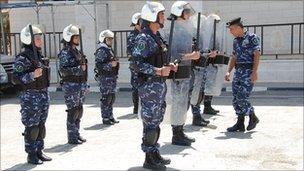Palestinian policewomen break traditional stereotypes
- Published

It is rare to see women police officers on the streets in any part of the Arab world.
But in the Palestinian territories where civil police are themselves, a relatively new concept, concerted efforts are under way to bring more women into the force.
In Hebron, the West Bank's biggest city, there are now about 50 women among the 900 police officers deployed locally.
Their presence challenges stereotypes but it is traditional values that make it necessary.
"The idea came about because Hebron is a conservative city and people didn't accept policemen entering and searching a house where women were present," says Hebron police chief, Brig Ramdan Awwad.
He says some Palestinian criminals have been taking advantage of strict religious and social codes to literally hide behind their wives' skirts.
Drug-dealers have used women as couriers, hiding contraband beneath their clothes in the certain knowledge that no Palestinian policeman would dare to search them.
Raids on suspects' homes have been fruitless because drugs and other illegal items were secreted with the women of the house.
The new women's police unit has ended this.
"The plan is not to go inside any house without having a police woman with the team," says Brigadier Awwad.
Turning heads
Women officers are given special riot training and proudly take part in raids alongside their male colleagues.
Insherah Abu Allam recalls one occasion when a team of male officers were denied access to search a house by its female residents.
She and her fellow women officers were also turned back so they scaled the walls and climbed onto the roof to gain entry.
"The male officers and all the neighbours couldn't believe what they were seeing. They stood there watching in awe," says Insherah. "We do not see women in these types of roles in the West Bank."
The women also play an important role in community liaison, particularly with young Palestinians.
Wajeeha Tahboub is in charge of the Juveniles' Unit in Hebron.
"My unit was established a year ago. I specialise in dealing with people under the age of 18," she says.
"I work at increasing trust between the community and the police. I visit schools and talk to children about the police force."
Cultural shift
Such a role is important in terms of changing perceptions of the police.
Crimes among Palestinians are still often still settled between families. The Hebron Police are trying to encourage people to seek their help.
A functioning police force is a key building block in the Palestinian's quest for statehood.
The Palestinian civil police force was set up after the signing of the 1993 Oslo Accords.
It is responsible for internal security and public order in areas fully controlled by the Palestinian Authority.
There is still co-operation with Israel, which says more effective West Bank policing will decrease the security threats it faces.
The new Palestinian police have received training and funds from the European Union and the United States.
They have encouraged the inclusion of women in the force. Several women have been appointed to high profile roles in the West Bank.
For her part, Wajeeda says her gender has never been an issue at work.
"The job in the police force is the same for men and women. There is no difference," she says.
However, Wajeeda and her female colleagues do get asked to pose for photographs more often then their male colleagues and say they are happy to oblige.